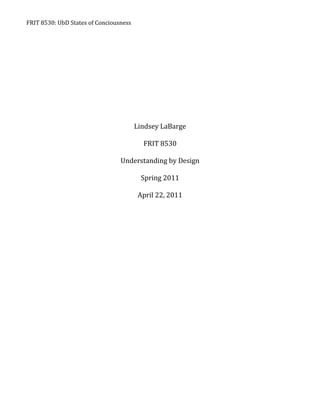
UbD States of Consciousness
- 1. Lindsey LaBarge<br />FRIT 8530<br />Understanding by Design<br />Spring 2011<br />April 22, 2011<br />Title of UnitStates of ConciousnessGrade LevelHigh School 9th-12thContent Standard: SSPBF2: The student will compare different states of consciousness. a. Describe the sleep cycle and circadian rhythm, b. Explain why we sleep and dream. c. Investigate the validity of hypnosis as a state of consciousness. d. Analyze the physical and psychological issues associated with addiction. e. Explain how the major drug classes (stimulants, depressants, and hallucinogens) affect neurotransmission and behaviors. Students will understand that: ● There are multiple stages of consciousness. ● There are multiple stages of sleep. ● The disturbance of the Circadian Rhythm can be detrimental to one’s health. ● The criteria of the Circadian Rhythm. ● There are many sleep disorders. Related Misconceptions: ● The more sleep you get, the better off you are. ● During sleep the body and brain “shut down”. ● A person under hypnosis is asleep or unconscious.Essential QuestionsOverarching Questions:What are the stages of sleep?What is Circadian Rhythm?How important is sleep?Topical Questions:Do you remember your dreams? What happens when you do not get enough sleep at night?Stage 3: Plan Learning ExperiencesWeek 11. This week should begin with a hook question. Some examples of appropriate hook questions are: “Why do we sleep?” or “What are Delta waves?” The students should be encouraged to discuss these questions and answer to the best of their ability.. There should be a pod cast video about the stages of sleep.2. Next, the essential questions should be introduced and displayed in a prominent area in the classroom. Also, the performance task should be introduced and the rubric should be handed out. This performance task should be worked on by the students throughout the three weeks and turned in at the very end.3. A vocabulary list should be passed out to the students. This list will contain key psychological features. Those features with unclear definitions will be discussed in the unit pod cast. The first assignment is for students to research and define all key terms on the vocabulary list.4. Explain to the students that we all live within a Circadian Rhythm. Define Circadian Rhythm for them as the daily cycle of activity based on chemicals in our bodies. List some things that can go wrong when the rhythm is disturbed. 5. Students should draw a poster of what they think their Circadian Rhythm looks like. Things like waking up, all their meals, when they feel tired and their mood should be included.6. Give quiz on the vocabulary terms and a short answer questions about sleep and consciousness.Week 21. Review vocabulary terms. Question: “What are the states of consciousness?” The answer is that there are five stages. Discuss the stages and answers any questions the students have.2. The students will be divided into groups. They will discuss the vocabulary terms and stages of conciousness.3. Have the students discuss their sleep in relation to the stages of consciousness. They should draw a picture of what sleep looks like in relation to the stages and this should be taken up and used as a participation grade.4. The students should vote on a stage of sleep or sleeping disorder to watch a video about. If they vote on Delta waves, a video will be shown that shows and explains key features of Delta sleep. The students will be required to take notes on features not listed on the vocabulary sheet and include at least two in their performance assessment.5. The students are provided a worksheet. They are to label all of the stages of consciousness on the worksheet. Also, they are going to explain the key features of each stage of consciousness.Week 31. The students are required to turn in their performance assessment. The first part is to trade their project with another student in the class. They will grade each other’s project using the rubric provided at the beginning of the unit. 2. The students turn in their written report explaining their state of consciousness. This includes at least one disorder that affects consciousness. Examples of this can include: insomnia, narcolepsy, sleep apnea, sleepwalking…3. At this point, the students will self grade their project using the rubric provided. Their grade and their peer review grade will be considered in their final grade for the performance assessment.4. The last part of the unit is to have each student present their state of consciousness to the class and present information about at least one sleep disorder.Notes to the Instructor1. The main purpose of this unit is for students to learn about the stages of consciousness in relation to Psychology. 2. They are provided ample time to reflect and review the parts of this unit that they are required to learn.3. They must use technology to research the vocabulary terms. They must also use technology to help research for their performance assessment.<br />